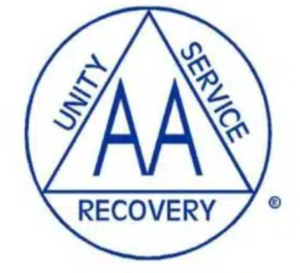

Have you heard of the various Anonymous support groups that are across the world, facilitating the needs of alcoholics, narcotics, gamblers and overeaters? They have frameworks that support those who seek such support. So, what if we compared them to what Church offers? Surely, it would be fairly similar – or would it? This article seeks to highlight that the Anonymous groups may offer a far greater welcome, coupled with a deeper sense of expressed vulnerability: all of which builds their community. Should the church follow Anonymous?
What is Anonymous?

I’m not talking about the computer hacking group ;-). Alcoholics Anonymous (AA) had its beginnings in 1935 at Akron, Ohio, with a meeting between a New York stockbroker and a surgeon. Both had been hopeless alcoholics. The circle and the triangle symbol, used by AA was introduced in 1955. The equilateral triangle represents the three-part answer – unity, recovery, and service – to a three-part disease – physical, mental, spiritual. The circle represents wholeness or oneness. The AA Big Book was released April 1939 and subsequent editions are used in AA meetings across the world. By reading the passages, members can offer their own reflections of their alcoholism, their recovery, to aid others.
Conflict of Interest?
I have attended a weekly AA meeting for the last 2 years. As I’m not an alcoholic, I am not privileged to speak at that meeting. It should be clearly stated that I do not understand what it feels like to be an alcoholic: I listen and walk alongside those whom attend. I am truly welcomed to their meeting. No names nor comments attributed to anyone I have encountered are included within this article. I have also considered how other businesses could be compared to the Church: such as Apple.
AA Meeting
As each member arrives, they are greeted with a handshake and called by their first name. If it is their first time of attending the group, they are offered encouragement. Throughout the meeting, people relate to their past suffering and ‘where they are now’. It is not always positive. If someone declares that they have succumbed to drink, then there is no criticism, but repeated offers for that person to call others, invitations for people to pop around. People are invited to find a sponsor, someone with experience of the AA process to recovery, so they can call them ‘whenever’, get advice on the dilemma they may be facing. Sponsors are not necessarily leaders of the AA group, anyone with experience of the 12 Steps process can act as a sponsor.
There is mention of the ‘God of your understanding’, reflecting the founding influence of Oxford Movement. People are free to come to an understanding, without direction, of their ‘higher power’. The 3-fold malady of alcoholism is mentioned each week in the preamble to the discussions. It is a ‘physical, mental and spiritual malady‘. Some members found themselves “handicapped by obstinacy, sensitiveness and unreasoning prejudice” towards spirituality (page 47-48, AA Big Book) but they are encouraged to explore. Often people will speak of their spiritual understanding, commenting that they meditate daily with their God. Should the church follow Anonymous?
What does the Anonymous and the Church offer?
| Anonymous | Church |
| This is a peer-led mutual-aid fellowship | It’s a church fellowship |
| They speak in a “God of our understanding” | They speak of a God who is described by the Church |
| Individuals choose their own sponsors for direct support to aid recovery | Members have a minister, possibly a pastoral leader, where discipleship is delivered in a top-down process |
| Individuals attend as many meetings as possible per week. It is imperative for their survival | Sunday is encouraged, plus a Bible study and/or prayer meeting if they are running |
| Each group is autonomous | This is hierarchal, connected by the Central Church |
| Members financially support the group | Members financially support the group with charitable status |
| Here is a desperate need, else there is death. They lose their alcoholic life to find a life in sobriety | They speak of a spiritual death, a death to sin |
| They declare “I am an alcoholic”, demonstrating an ongoing vulnerability | They declare “I am a sinner”, as are those outside of the church |
Let’s look at these points in turn
The book ‘Why can’t Church be more like an AA Meeting‘ suggests that the AA member is one who is “comfortable with brokenness and expressing vulnerability, but is suspicious with claims of piety and respectability“.
Vulnerability
I am minded of the song, ‘Truth Be Told’, by Matthew West which starts with “We are fine, we are fine, we are fine but we are not“. It speaks of ‘church’ which is comfortable within its individual protective boundaries, of decency; where we might discuss ‘sin’ in its generality but not be vulnerable with one another. The members of the AA are encouraged to be open, honest, and speak of their issues. Their openness is key to the strength of their community. There’s little point in “faking it” as the alcoholism will otherwise significantly affect their life.
Who is God?
Our God is prescribed, through the Hebrew Scriptures and the New Testament, and articulated by ministers and local preachers. Our culturally derived orthodoxy may be stifling to many. Any differing perspectives are probably challenged as we are not permitted variance to any degree. It challenges our control, our power over one another; a vestige of the birth of the modern church perhaps. What of God as a mother, Jesus not as a fair skinned ‘Disney-esque’ character, or Christ as Christa? Where is the God of our understanding? Is this too akin to liberation theology? Jesus is described in the Nicene Creed as “God’s only Son, our Lord; who was conceived by the Holy Spirit, born of the Virgin Mary“: God on Earth. We say that God is a mystery but we declare that we decide when another’s depiction is acceptable or not. Should the church follow Anonymous?
Discipleship
The church system has ministers, preachers and pastoral leaders who can administer support where needed. Although contact can be made, either in person, or via electronic means, actual reverse contact to those leaders is, anecdotally, sparse in comparison. To move towards a peer-led system could be fraught with safeguard concerns. Adhoc support would need multiple mitigations. Nevertheless, this form of support can be deemed to be discipleship. Is it a form of top-down delivered, and not peer-led, discipleship?
How often to attend?
Attendance on Sunday in Church is stable for those that typically attend but through decreased mobility, both in terms of transportation and health, we can find this may limit attendance at meetings. In my experience, hybrid meetings are positive with the anonymous groups, as they can be within Church. Possibly the demographics may differ, but anecdotally, the age range isn’t significantly different between the AA and Church ‘congregations’. Nevertheless, to the anonymous member, attendance is more than necessary, it is essential. That sense of togetherness, community is not just warming but part of their own recovery action plan. Is it within Church, can we ‘go it alone’? Can church members decide not to attend as they “know that they are saved?”
Within AA, there is a call for total abstinence, don’t take the first drink, one day at a time (ODAAT). They just one day away from ‘losing all’. Do we see the same degree of commitment from church members?
Doing Life Together
The Methodist Church has a Methodist Way of Life. Twelve key pointers which denote areas where, if applied to our lives, can make such a difference. These 12 areas help us to see, feel and experience God in a much deeper way. But Rules of Life are built upon that desire to engage, the fruits of such support may well be limited if we are ‘lukewarm’. The AA member has to ‘want to buy into’ the programme, “How it works“. The 12 steps programme is one that is encouraged but not pushed – the individual has to want to commit to it. Offering it as a smorgasbord of delicacies may not be sufficient. I love that in the introductory video the Methodist Church speaks of engaging wholeheartedly with the Methodist Way of Life, taking it a day at a time – akin to ODAAT. Have a look at the publicity video below:
You don’t invite someone to AA, they need to want to attend. Do we do this with those we wish to attend Church? Should the church follow Anonymous?
Spirituality
There are many courses, including the fundamental Alpha course, that seeks to invite people into deeper spirituality. Akin to Methodism, where Wesley sought sanctification, that onward journey towards spiritual perfection, AA members might relate as they use the phrase : “We claim spiritual progress rather than spiritual perfection” (AA Big Book, p60).
Conclusion
The AA was formed as a result of church members seeking to find recovery for their addiction. The AA 12 step process was formed upon underlying Christian principles, despite the AA offering recovery to all. So, is it appropriate to seek to discern church within the AA?
Many may go to Church, due to tradition, as a way of ‘ensuring their way to heaven’, or finding a way to God. We may go to Church to be filled each Sunday. Could AA be a place where people go multiple times a week to help and support like-minded people to be filled. It is in that connexion – to use a Methodist word – that people find community, a place where they can grow.
The AA members attend because of their desperation due to alcoholism. What if church members felt that desperation for people coming to the Church. It isn’t about fixing others, just acknowledge them and their situation.
Churches may be reticent to make links to AA groups, but the early church attracted a diverse array of members. In my experience, that connection with the various Anonymous groups can only strengthen the churches understanding of humanity. In Matthew’s Gospel (Matt 28:19-20) church members are encouraged to support individuals in their faith, creating a movement. Are we all not needing recovery of some kind? Should the church follow Anonymous?
What’s your response to this? What have I missed or not appropriately considered?
I found the dialogue interesting and I enjoyed
Do you agree with the perspective?